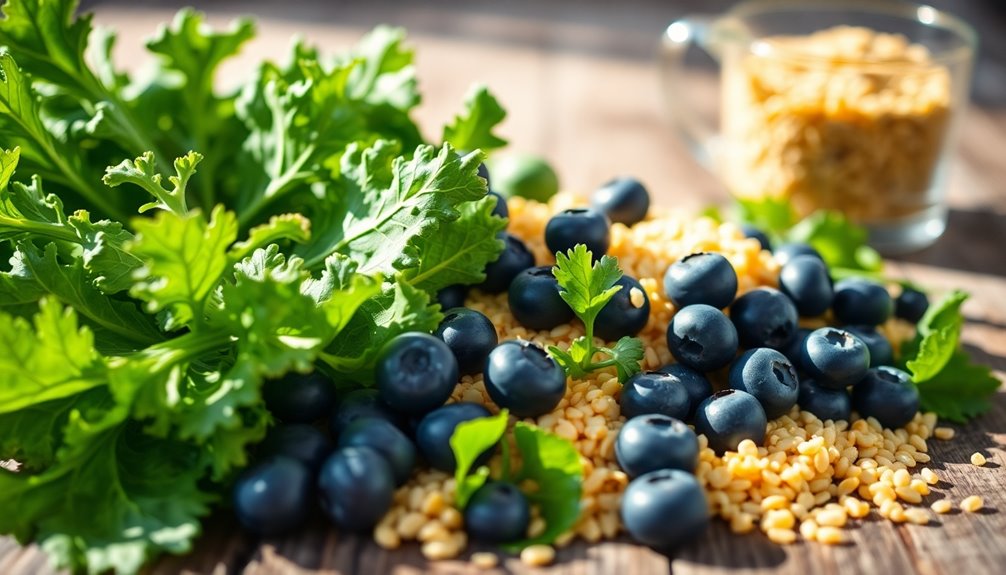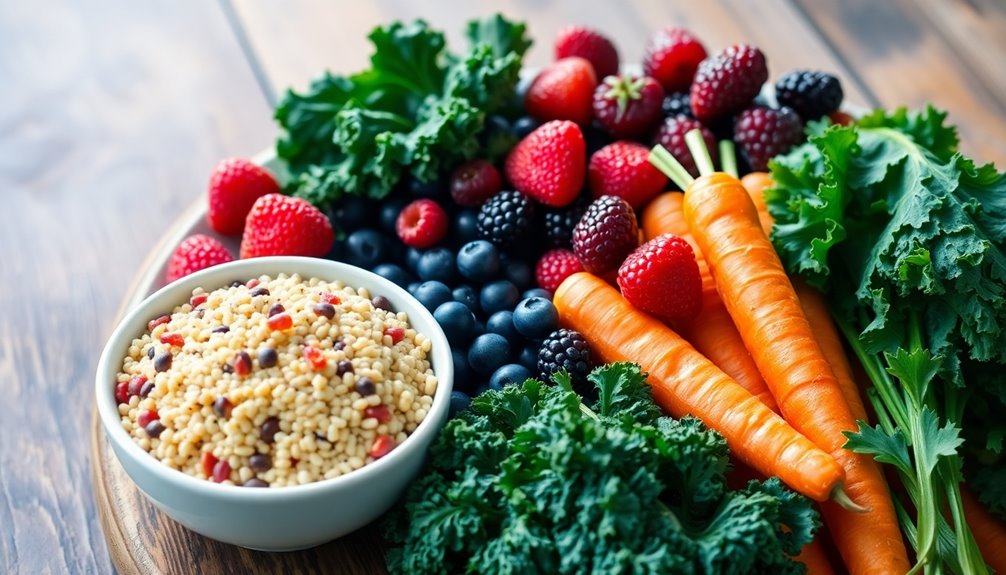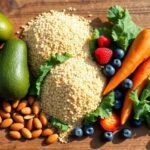Fiber's essential for a balanced diet, offering a range of health benefits. It promotes digestive health by regulating bowel movements and supporting a healthy gut microbiome. When it comes to weight management, fiber helps control appetite and increases feelings of fullness, making it easier to maintain a healthy weight. Additionally, fiber improves heart health by lowering LDL cholesterol and blood pressure, reducing the risk of heart disease. It also stabilizes blood sugar levels, enhancing insulin sensitivity. Incorporating enough fiber into your routine can have significant long-term health impacts, and there's plenty more to discover about its benefits.
Key Takeaways
- Fiber regulates bowel movements and prevents constipation, promoting overall digestive health.
- It aids in weight management by increasing feelings of fullness and controlling appetite.
- Fiber supports heart health by lowering LDL cholesterol levels and reducing blood pressure.
- It plays a crucial role in blood sugar regulation, improving insulin sensitivity and lowering diabetes risk.
- Fiber may reduce the risk of certain cancers, including colorectal cancer, enhancing gastrointestinal health.
What Is Dietary Fiber?

Dietary fiber, often referred to as roughage, is an essential component of a balanced diet that plays a vital role in maintaining digestive health. It's a type of carbohydrate that your body can't digest, and it's pivotal for ensuring your digestive system functions smoothly.
When you talk about fiber, you're generally looking at two types: soluble and insoluble. Soluble fiber dissolves in water and can help manage blood sugar levels, while insoluble fiber adds bulk to your stool, aiding in regular bowel movements.
To enhance your fiber intake, you'll want to include a variety of fiber sources in your diet. Fruits, vegetables, whole grains, legumes, nuts, and seeds are all excellent options that can help you reach your daily fiber goals. For instance, a simple switch from white bread to whole-grain bread can notably increase your fiber consumption. Additionally, a plant-based diet is typically rich in fiber-rich foods which can significantly boost your overall health.
Aim for at least 25 grams of fiber per day for women and 38 grams for men, although individual needs may vary.
Incorporating fiber doesn't just benefit your digestive system; it also fosters a sense of community around healthy eating habits. Sharing meals rich in fiber with friends or family can create connections while promoting better health.
Digestive Health Benefits

Fiber plays an essential role in promoting digestive health by making sure your gastrointestinal system operates efficiently. When you consume sufficient fiber, it helps regulate bowel movements and prevents constipation. This is vital for maintaining gut health, as regular elimination of waste keeps your digestive system functioning smoothly.
One of the key benefits of fiber is its ability to support healthy gut bacteria. These beneficial microorganisms thrive on fiber, particularly soluble fiber found in foods like oats, beans, and fruits. When you include fiber-rich foods in your diet, you're not just nourishing yourself; you're also feeding your gut bacteria, which play a fundamental role in digestion and overall health.
A diverse gut microbiome can enhance nutrient absorption and protect against various gastrointestinal issues. Additionally, a diet that includes variety of delicious Keto recipes can help ensure you're not only getting enough fiber but also enjoying your meals.
If you find it challenging to get enough fiber through diet alone, fiber supplements can be a convenient option. These supplements often contain soluble or insoluble fiber that can help you reach your daily fiber intake goals. However, it's important to choose high-quality fiber supplements and consult with a healthcare professional to make sure they fit your dietary needs.
Incorporating a variety of fiber sources, whether through whole foods or supplements, can lead to improved digestive health. You'll likely experience increased regularity, reduced bloating, and a greater sense of well-being. By prioritizing fiber in your diet, you're taking a significant step toward supporting your digestive system and fostering a healthier gut environment.
Weight Management Support

In addition to promoting digestive health, fiber can also play a significant role in weight management. When you integrate fiber-rich foods into your diet, you're not just supporting your digestive system; you're also aiding your efforts to maintain a healthy weight.
High-fiber foods, such as fruits, vegetables, and whole grains, tend to be more filling. This means you're likely to eat less while still feeling satisfied, which can facilitate appetite control.
Moreover, fiber influences your gut microbiota, the diverse community of microorganisms in your digestive system. A healthy gut microbiota is essential for overall wellness and can impact how your body processes and stores fat. Studies have shown that a balanced gut microbiota can enhance metabolic efficiency and support weight management.
By consuming soluble fiber, you can promote the growth of beneficial bacteria, which in turn can help regulate hunger and cravings. Additionally, incorporating a custom keto diet plan can further optimize your dietary choices to support weight management.
Incorporating fiber into your meals isn't just about adding bulk; it's about creating a nourishing, balanced approach to eating that aligns with your weight management goals. Whether you're enjoying a hearty bowl of oatmeal or snacking on crunchy veggies, you're making choices that support both your health and your desire to feel good in your body.
Embracing fiber as part of your daily routine creates a sense of belonging to a community focused on health and wellness, ultimately making your journey toward weight management more enjoyable and sustainable.
Heart Health Improvement

A heart-healthy lifestyle thrives on a diet rich in fiber, which can greatly reduce the risk of cardiovascular diseases. Incorporating fiber into your meals not only helps maintain a healthy weight but also plays a significant role in cholesterol reduction. By consuming soluble fiber, you can help lower LDL (bad) cholesterol levels, which is essential in promoting cardiovascular protection.
Here's a quick snapshot of how different types of fiber contribute to heart health:
| Type of Fiber | Sources | Benefits |
|---|---|---|
| Soluble Fiber | Oats, beans, apples | Reduces LDL cholesterol |
| Insoluble Fiber | Whole grains, nuts, vegetables | Aids in digestion |
| Functional Fiber | Supplements, fortified foods | Enhances overall fiber intake |
Incorporating a variety of fiber sources into your diet not only helps with cholesterol levels but also improves heart health by reducing inflammation and supporting healthy blood pressure levels. Consuming fiber-rich foods regularly can also help you feel fuller longer, leading to better food choices and a more balanced diet.
Ultimately, making fiber a priority in your daily meals can empower you to take control of your heart health. You'll find that as you embrace these dietary changes, you're not just improving your own well-being, but also fostering a sense of community with others who share similar health goals. Start your journey today toward a heart-healthy lifestyle and enjoy the benefits that fiber brings.
Blood Sugar Regulation

Maintaining stable blood sugar levels is another important benefit of incorporating fiber into your diet. When you consume fiber, it helps slow down the absorption of sugar into your bloodstream, preventing those dreaded spikes and crashes that can leave you feeling drained. This regulation not only stabilizes your energy levels but also supports your overall well-being. Additionally, a balanced diet that includes fiber can enhance your body's ability to utilize stored energy effectively, which is crucial for maintaining optimal health.
Here are three convincing reasons to prioritize fiber for blood sugar control:
- Sustained Energy: By keeping your blood sugar steady, fiber guarantees that your energy levels remain consistent throughout the day, helping you stay productive and engaged.
- Balanced Gut Bacteria: Fiber acts as a prebiotic, nourishing your gut bacteria. A healthy gut microbiome plays an important role in regulating blood sugar and improving insulin sensitivity, which is essential for your metabolic health.
- Reduced Risk of Diabetes: Incorporating fiber-rich foods into your meals can lower your risk of developing type 2 diabetes. Studies show that individuals who consume more fiber have better blood sugar control and lower insulin resistance.
Frequently Asked Questions
Can Fiber Help With Skin Health and Appearance?
Yes, fiber can positively impact your skin health and appearance. By promoting digestive health, fiber helps your body eliminate toxins, which can lead to a clearer complexion.
Additionally, certain fibers possess anti-aging properties, as they support collagen production and skin elasticity.
When you include fiber-rich foods in your diet, you're not just nourishing your gut; you're also enhancing your skin's essentiality and radiance, helping you achieve a healthier, more youthful look.
What Are the Best Fiber Sources for Vegetarians?
If you're a vegetarian looking to boost your fiber intake, you've got plenty of great options.
Fiber-rich vegetables like broccoli, carrots, and Brussels sprouts can enhance your meals, while beans and lentils offer excellent plant-based protein.
Whole grains, such as quinoa and brown rice, also pack a fiber punch.
Incorporating a variety of these foods into your diet not only supports your digestive health but also helps you feel fuller and more satisfied.
How Does Fiber Impact Mood and Mental Health?
So, you thought your mood swings were just a quirky personality trait? Think again! Fiber's got a secret superpower: it nurtures your gut bacteria, which in turn supports cognitive function. When your gut's happy, you're more likely to feel balanced and emotionally stable.
Studies show that a healthy gut can lead to improved mental health, so don't underestimate the power of those beans and whole grains. Your mood deserves that fiber boost!
Is It Possible to Consume Too Much Fiber?
Yes, it's possible to consume too much fiber. While a high fiber intake supports digestion, exceeding recommended amounts can lead to bloating, gas, or even constipation. Balancing your fiber intake is essential, especially if you're adjusting your diet. If you notice discomfort, consider moderating your intake.
Aim for a gradual increase to help your body adapt, supporting both your digestion and weight management goals effectively. Listen to your body and adjust accordingly.
Can Fiber Supplements Replace Natural Fiber Sources?
Fiber supplements can't fully replace natural fiber sources. While they can help boost your fiber intake, they often lack the additional nutrients, vitamins, and minerals found in whole foods. Relying solely on supplements may lead to imbalances in your diet.
It's important to incorporate a variety of fiber-rich foods like fruits, vegetables, and whole grains to reap the full benefits of fiber. Remember, balance is key for overall health and well-being.
Conclusion
Incorporating fiber into your diet isn't just about health; it's a chance to connect with your body and its needs. As you enjoy whole grains, fruits, and vegetables, you're not only improving digestion and heart health but also enhancing your overall well-being. It's interesting how something as simple as dietary fiber can lead to profound benefits, reminding us that small, mindful choices can dramatically shape our health journey. Embrace fiber, and you'll likely discover a more vibrant you.



